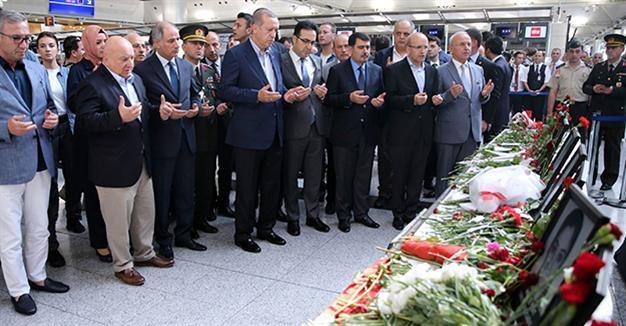Turkey seeks militants linked to Istanbul attack near Syrian border: Media
ISTANBUL – Reuters

A handout photo released by the Turkish Presidential press office shows Turkish President Recep Tayyip Erdoğan (C) praying near flowers and portraits of the victims of the Istanbul Ataturk Airport attack at the International departure terminal in Istanbul on July 2, 2016 - AFP photo
Turkish authorities are seeking two suspected Islamic State of Iraq and the Levant (ISIL) militants thought to be linked to the June 28 Istanbul Atatürk Airport attack and believed to be in hiding near the border with Syria, Turkish daily Yeni Şafak reported on July 6.
Turkey has jailed a total 30 suspects pending trial over the triple suicide bombing at one of Europe’s busiest airports, which killed at least 45 people and wounded hundreds, the deadliest in a series of bombings this year in Turkey.
It said they were from Dagestan, a mainly Muslim province of Russia’s North Caucasus region. The paper did not identify its sources for the story.
“Security and intelligence units have taken top level measures in the area to capture the terrorists given the possibility that they could cross into Syria,” it said.
Other members of the same ISIL team had fled to the southeastern provinces of Kilis and Gaziantep and were hiding there, while militants from the Caucasus were using fake identity papers and receiving support from ISIL cells, it said.
Turkish officials were not commenting on reports about the investigation, although one government official said the attackers were Russian, Uzbek and Kyrgyz nationals. President Recep Tayyip Erdoğan said ISIL militants from the former Soviet Union were behind the attack.
The pro-government Yeni Şafak said two ISIL suspects were believed to be hiding in woodlands in the Yayladağı area of the southern province of Hatay and could be planning to change their appearance and join rebel groups in Syria.
Eid-al-Fitr attacksThe Istanbul bombing was followed by major attacks in Bangladesh, Iraq and Saudi Arabia in the past week, all apparently timed for the run-up to Eid al-Fitr, the holiday marking the end of Ramadan.
“Using sacred Islam’s name, exploiting it, this terrorist group which spills Muslim blood has gone as far as attacking the town where the mosque and blessed remains of our Prophet [Muhammad] are located,” Erdoğan said in a speech on July 5.
“Daesh [ISIL] is a dagger plunged into the chest of Muslims. Whoever gives support to this group, whether out of sectarian fanaticism or another motive, commits the same sin,” he added.
In last week’s attack, three bombers opened fire to create panic outside the airport before two of them got inside and blew themselves up. The third militant detonated his explosives outside the entrance to the international arrivals terminal.
The Kremlin said on July 6 it believed the Istanbul airport attack could have been a result of Turkish and European security services ignoring Moscow’s signals about suspected terrorists hiding in Turkey and Europe.
“Over the past many years, the Russian side... has informed our Turkish and European colleagues that persons suspected of being linked to terrorism... find shelter both in Turkey and in a number of other European countries,” Kremlin spokesman Dmitry Peskov told reporters.
“In most cases such signals from the Russian side have not been given proper attention or any reaction by our colleagues. To our regret, these [attacks] can be a consequence of such disregard.”
Moscow says that thousands of Russian citizens and citizens of other former Soviet states have joined ISIL by traveling through Turkey to reach Syria.
